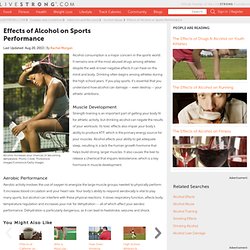

Effects Of Alcohol On Sports Performance. Alcohol consumption is a major concern in the sports world.

It remains one of the most abused drugs among athletes despite the well-known negative effects it can have on the mind and body. Drinking often begins among athletes during the high school years. If you play sports, it's essential that you understand how alcohol can damage -- even destroy -- your athletic ambitions. Strength training is an important part of getting your body fit for athletic activity, but drinking alcohol can negate the results of your workouts. Its toxic effects also impair your body's ability to produce ATP, which is the primary energy source for your muscles. Alcohol & Sports Performance. It goes without saying that alcohol is more likely to affect your physical performance for the worse and that any serious athlete will avoid alcohol during training or sporting events.

Whilst occasional drinking is acceptable, consuming alcohol in conjunction with physical activity is rarely recommendable. Positive Effects of Alcohol in Sport There are some perceived psychological and physiological benefits to alcohol consumption to aid performance in sporting activities, although most are considered purely psychological. Alcohol disinhibits you and so can increase your self confidence, helping tackle and reduce performance anxiety. It also decreases your pain sensitivity, meaning that some injuries might be considered by you quite minor when usually they could interfere with your performance.
GCSE Bitesize: Doping. GCSE Bitesize: Diet. KS3 Bitesize: Science - Diet, drugs and health - Introduction.